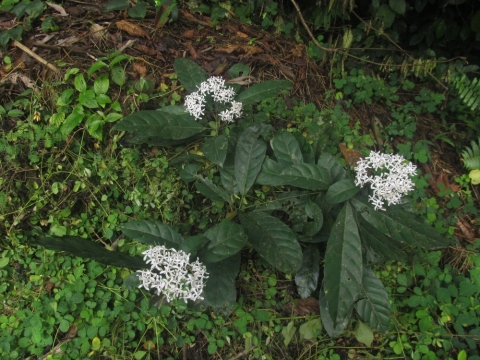Pavetta owariensis
P.Beauv.
Rubiaceae
Ixora africana P.Beauv. ex A.Rich.
Ixora glaucescens (Hiern) Kuntze
Ixora owariensis (P.Beauv.) Poir.
Pavetta chionantha K.Schum. & K.Krause
Pavetta eketensis Bremek.
Pavetta glaucescens Hiern
Pavetta nigritana Bremek.
Pavetta smythei Hutch. & Dalziel
Common Name:
General Information
Pavetta owariensis is an evergreen shrub or a small tree that can range widely in height from 2 metres up to 15 metres tall[
479- Title
- Annals of the Missouri Botanical Garden. Volume 83
- Publication
-
- Author
-
- Website
- http://www.biodiversitylibrary.org
- Publisher
- Missouri Botanical Garden
- Year
- 0
- ISBN
-
- Description
- Contains, amongst other things, an article on ethnobotany. It can be downloaded from the internet.
].
The plant is harvested from the wild for local use as a medicine.
Known Hazards
None known
Botanical References
479- Title
- Annals of the Missouri Botanical Garden. Volume 83
- Publication
-
- Author
-
- Website
- http://www.biodiversitylibrary.org
- Publisher
- Missouri Botanical Garden
- Year
- 0
- ISBN
-
- Description
- Contains, amongst other things, an article on ethnobotany. It can be downloaded from the internet.
Range
West tropical Africa - Liberia to Nigeria and Cameroon, south to Gabon and Congo
Habitat
An understorey plant in mature forest, also in secondary forest and at forest edges; at elevations from 800 - 1,400 metres[
332- Title
- The Useful Plants of West Tropical Africa.
- Publication
-
- Author
- Burkil. H. M.
- Publisher
- Royal Botanic Gardens; Kew.
- Year
- 1985 - 2004
- ISBN
-
- Description
- Brief descriptions and details of the uses of over 4,000 plants. A superb, if terse, resource, it is also available electronically on the Web - see http://www.aluka.org/
,
479- Title
- Annals of the Missouri Botanical Garden. Volume 83
- Publication
-
- Author
-
- Website
- http://www.biodiversitylibrary.org
- Publisher
- Missouri Botanical Garden
- Year
- 0
- ISBN
-
- Description
- Contains, amongst other things, an article on ethnobotany. It can be downloaded from the internet.
].
Properties
| Medicinal Rating |      |
| Habit | Evergreen Shrub |
| Height | 3.00 m |
| Pollinators | Insects |
| Cultivation Status | Wild |
Cultivation Details
Many Pavetta species, including this one, produce leaves with bacterial nodes - these bacteria live in symbiosis with the plant and pass into any seeds that are produced, thus seedlings are already inocculated with the bacteria[
310- Title
- Plant Resources of Southeast Asia
- Publication
-
- Author
-
- Website
- http://proseanet.org/
- Publisher
-
- Year
- 0
- ISBN
-
- Description
- Lots of information on the uses of the plants of SE Asia.
]. It is not certain what function the bacteria play, theories include nitrogen-fixation, growth-regulation and making the leaves poisonous to livestock[
295- Title
- PlantZAfrica.com
- Publication
-
- Author
-
- Website
- http://www.plantzafrica.com
- Publisher
-
- Year
- 0
- ISBN
-
- Description
- An excellent site giving detailed descriptions and uses of many S. African plants.
].
Edible Uses
None known
Medicinal
The stem bark is anthelmintic[
310- Title
- Plant Resources of Southeast Asia
- Publication
-
- Author
-
- Website
- http://proseanet.org/
- Publisher
-
- Year
- 0
- ISBN
-
- Description
- Lots of information on the uses of the plants of SE Asia.
].
The leaves are said to contain 0.6% alkaloids[
332- Title
- The Useful Plants of West Tropical Africa.
- Publication
-
- Author
- Burkil. H. M.
- Publisher
- Royal Botanic Gardens; Kew.
- Year
- 1985 - 2004
- ISBN
-
- Description
- Brief descriptions and details of the uses of over 4,000 plants. A superb, if terse, resource, it is also available electronically on the Web - see http://www.aluka.org/
].
Both ethanol and acetone extracts of the bark have been shown to cause a reduction in size of periovular granuloma formation in the liver when used to treat schistosoma infection. This effect was most pronounced with the ethanol extracts of the plant, when using either 'white bark' or 'red bark' varieties. Proanthocyanins are the likely active compound[
310- Title
- Plant Resources of Southeast Asia
- Publication
-
- Author
-
- Website
- http://proseanet.org/
- Publisher
-
- Year
- 0
- ISBN
-
- Description
- Lots of information on the uses of the plants of SE Asia.
].
Acetone extracts of the 'red bark' variety, containing the highest concentration of proanthocyanins, caused a marked reduction in the number of eggs in the liver and intestine[
310- Title
- Plant Resources of Southeast Asia
- Publication
-
- Author
-
- Website
- http://proseanet.org/
- Publisher
-
- Year
- 0
- ISBN
-
- Description
- Lots of information on the uses of the plants of SE Asia.
].
Eleven proanthocyanidins, isolated from the stem bark, were investigated for molluscicidal activity against Biomphalaria glabrata, but at the tested concentrations (3-100 ppm), none of the compounds were lethal to the snails[
310- Title
- Plant Resources of Southeast Asia
- Publication
-
- Author
-
- Website
- http://proseanet.org/
- Publisher
-
- Year
- 0
- ISBN
-
- Description
- Lots of information on the uses of the plants of SE Asia.
].
Other Uses
None known
Propagation
Seed -
Cuttings
Air layering
If you have any useful information about this plant, please leave a comment. Comments have to be approved before they are shown here.







 Useful Tropical Plants Database 2014 by
Ken Fern,
web interface by
Ajna Fern
with help from
Richard Morris.
Useful Tropical Plants Database 2014 by
Ken Fern,
web interface by
Ajna Fern
with help from
Richard Morris.